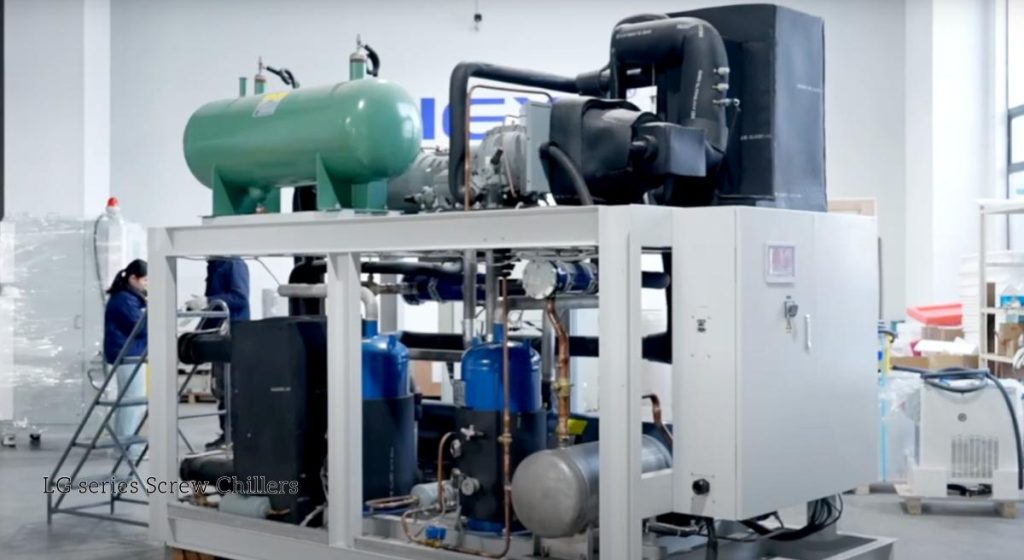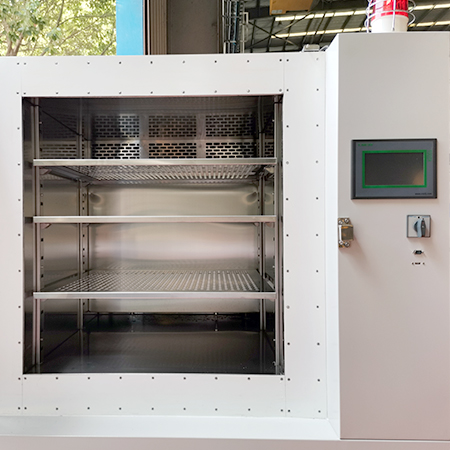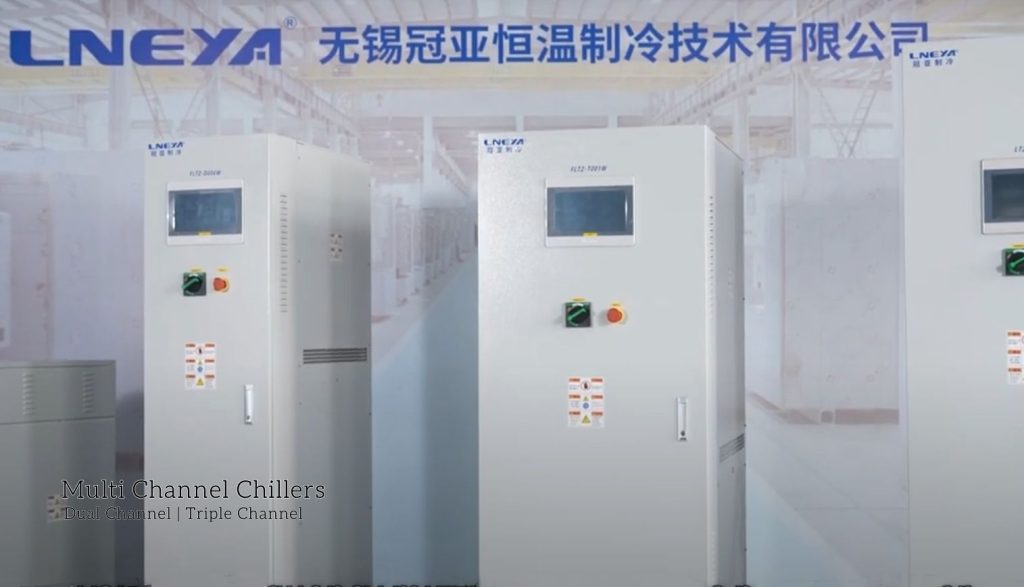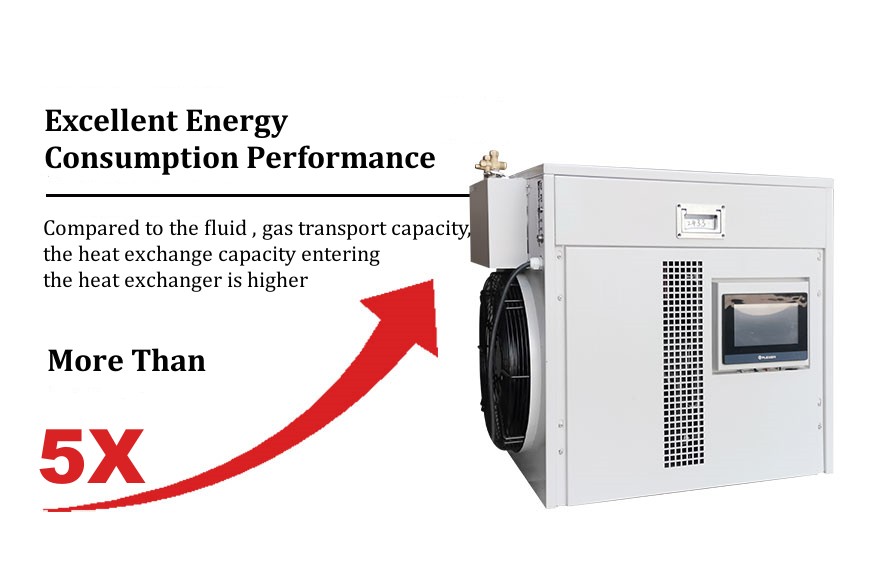Industrial Chiller vs HVAC: What is the Difference?
Viele Menschen nehmen fälschlicherweise an, dass Industriekälteanlagen und HLK-Systeme sind ein und dasselbe. Tatsächlich können Kältemaschinen als Kältequellen für HLK-Anlagen verwendet werden, oder sie können in vielen industriellen Szenarien unabhängig voneinander eingesetzt werden. In diesem Artikel werden die Unterschiede zwischen den beiden Systemen erläutert, damit Sie die Kühlanlagen besser verstehen.
Was ist eine industrielle Kältemaschine?

Ein industrieller Kaltwassersatz ist ein industrielles Kühlgerät, das Wärme von Geräten oder Prozessen abführen kann, indem es Wärme absorbiert, wenn das Kältemittel verdampft. Er wird in vielen Branchen eingesetzt, die eine strenge Temperaturkontrolle erfordern. Da sie eine Kältequelle liefern kann, wird sie auch in HLK-Systemen eingesetzt. Die von ihm erzeugte Kälte wird dann zum Gebläsekonvektor oder zum Klimakasten in den Innenräumen transportiert, um die Luft zu kühlen.
Erfahren Sie mehr über industrielle Kältemaschinen.
Was ist HVAC?
HVAC steht für Heating, Ventilation, and Air Conditioning (Heizung, Lüftung und Klimaanlage). Es kann die Temperatur, die Luftfeuchtigkeit und die Luftqualität des Raums regulieren. Unabhängig von der Außentemperatur sorgt ein HVAC-System dafür, dass Sie sich in den Innenräumen wohlfühlen. Es wird häufig in Wohnungen, Bürogebäuden, Einkaufszentren und Hotels eingesetzt.

Industriekühler vs. HVAC
Anmeldung
• Industrial chiller: Kältemaschinen verwenden im Allgemeinen Kältemittel, um Kühlmittel wie Wasser, Öl und Ethylenglykol im Verdampfer zu kühlen, und transportieren diese Kühlmittel dann zu den Geräten und Prozessen, die gekühlt werden müssen, um sie zu kühlen. Bei den Kühlobjekten handelt es sich in der Regel um Geräte wie Laserköpfe, Galvanisiertanks, Vakuumöfen oder Prozesse wie Spritzgießen, Destillation und Kondensation. Ihre Hauptfunktion besteht darin, die Stabilität und Genauigkeit des Prozesses zu verbessern.
• HVAC: Das Kühlobjekt der HLK ist die Luft im Raum. Im Verdampfer kann das Kältemittel die Wärme in der Luft aufnehmen, ohne das Kühlmittel zu durchströmen. Es wird hergestellt, um den menschlichen Komfort zu verbessern, daher wird es an Orten installiert, die ein Raumklima erfordern.
Temperatur
• Industrial chiller: In der Industrie gibt es strenge Temperaturanforderungen, vor allem in der Präzisionsfertigung, z. B. in der Halbleiterindustrie, wo die Temperaturschwankungen nicht mehr als ±0,1℃ betragen dürfen, und bei einigen Prozessen sogar nicht mehr als ±0,05℃. Darüber hinaus muss das Kühlmittel möglicherweise in der gesamten Phase der Produktherstellung erwärmt werden, z. B. bei der Erwärmung von Kunststoffteilchen und der Kühlung von Formen beim Spritzgießen. Dies erfordert einen großen Temperaturbereich und eine hohe Temperaturregelgenauigkeit für das Prozesskühlsystem.
• HVAC: Der Betriebstemperaturbereich von HLK-Anlagen wird auf der Grundlage der für den menschlichen Körper angenehmsten Temperatur festgelegt. Die angenehmste Temperatur für den menschlichen Körper liegt im Allgemeinen bei 20℃~24℃ im Winter und 23℃~26℃ im Sommer. Daher liegt der Temperaturbereich des HVAC-Systems im Allgemeinen bei 16℃~30℃, was die optimale Temperatur vollständig abdecken kann. Da es nur den Komfort des Körpers sicherstellen muss, ist seine Temperaturregelungsgenauigkeit nicht so hoch wie die des Kühlers, im Allgemeinen etwa ±1℃.
Fähigkeit zum kontinuierlichen Betrieb
• Industrial chiller: Der Produktionsprozess in der Fabrik wird in der Regel nicht unterbrochen, daher muss die Prozesskälteanlage über einen langen Zeitraum hinweg kontinuierlich arbeiten können. Bei der Konstruktion der Anlagen berücksichtigen die Ingenieure dieses Problem, und die meisten Geräte sind für einen 24/7-Betrieb ausgelegt.
• HVAC: HLK wird in Gebäuden eingesetzt. In Bürogebäuden und Einkaufszentren wird die Klimaanlage nur in Betrieb genommen, wenn tagsüber viele Menschen unterwegs sind, und nachts oder an Feiertagen wird sie abgeschaltet. In vielen Bürogebäuden wird sie nicht einmal im Frühjahr und Herbst benutzt. Sie muss also nicht 24 Stunden lang ununterbrochen laufen.
Kosten
• Industrial chillers: Um den Anforderungen an hohe Präzision, einen weiten Temperaturbereich und einen energiesparenden Langzeitbetrieb gerecht zu werden, müssen industrielle Kältemaschinen mit leistungsfähigeren Kompressoren, Wärmetauschern, Temperaturregelungs- und Steuerungssystemen ausgestattet werden. Dadurch steigen auch die Herstellungskosten. Ihr Preis entspricht jedoch voll und ganz ihrem Wert.
• HVAC: Da das Streben nach Leistung nicht so hoch ist wie bei Kältemaschinen, sind die Anfangsinvestitionen für HLK-Geräte relativ gering.
| Artikel | Industriekühler | HVAC-System |
| Ziel | Ausrüstung und industrielle Prozesse | Menschlicher Komfort |
| Temperatur-Genauigkeit | ±0.1℃ or even more precise | ±1~2℃ |
| Anwendungsszenarien | Fabriken, Laboratorien, Medizin, Fertigung | Einkaufszentren, Büros, Wohnungen, Krankenhäuser, Gebäude |
| Systemkomponenten | Kältemaschine, Pumpe, Kühlturm, Ventilator | Heizung, Kühlung, Lüftung, Klimatisierung |
| Betriebstemperatur | -150℃ bis +350℃ oder größer | +16℃ bis +30℃ |
| Kosten | Hoch | Mäßig |
Schlussfolgerung
Industrielle Kältemaschinen sind Teil von HLK-Systemen, werden aber häufiger unabhängig für die industrielle Kühlung eingesetzt. Wenn Sie Bedarf an industrieller Kühlung haben und eine zuverlässige Kältemaschine kaufen möchten, ist es für LNEYA eine Ehre, Ihnen zu helfen. Wir bieten Standard- und kundenspezifische Geräte verschiedener Typen und Leistungen an, um Ihnen zu helfen, die am besten geeignete Lösung für Ihren Temperatursteuerungsbedarf zu finden.
Besprechen Sie Ihren Kühlbedarf mit LNEYA.
Verwandte Kühlgeräte
KONTAKT US
TEL:
EMAIL:
WeChat & WhatsApp:

Wechat QR

Haben Sie eine Frage oder benötigen Sie ein Angebot? Füllen Sie das untenstehende Formular aus, und unser Team wird sich innerhalb von 24 Stunden bei Ihnen melden.
 LNEYA Industriekühler Hersteller Lieferant
LNEYA Industriekühler Hersteller Lieferant
















